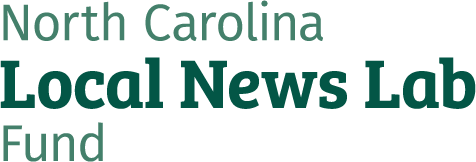One year after Hurricane Helene: Four funding insights for response, recovery, and resilience
by Lizzy Hazeltine
One year ago this week, Hurricane Helene swept through Western North Carolina, causing destruction in communities across the region. This hurricane season, the people of Western North Carolina continue to rebuild in many ways: from homes and roads, to the routines, places, and stories that helped people feel a sense of connection and belonging. Local news and community organizations continue their essential work alongside their neighbors, helping navigate recovery and offer handholds and hope despite ongoing challenges.
Local news organizations saved lives last year. In the immediate days after the storm, they ensured people had access to news and information about keeping themselves and their families safe. Among them, JMPRO Community Media ventured off-road to check on neighbors in low-lying trailer parks and distributed essential supplies. Compañeros Inmigrantes de las Montañas en Accion (CIMA) activated their grassroots network to translate and share critical information, from water availability to law enforcement activity. And Blue Ridge Public Radio collaborated with towns across the West to rebroadcast emergency updates for weeks while cell towers and internet were down.
They didn't stop there, and they haven’t stopped since. Over the last year, local news and community organizations have continued to respond to their communities’ changing needs and help pave the path for where we can go from here.
Trusted communicators and newsrooms across the region like Smoky Mountain News and Mountain Xpress continue to unpack the intricacies of government forms and other recovery resources. Alongside statewide organizations including NC Health News, local journalists have also begun the meticulous work of tracking state, federal, and philanthropic dollars flowing to the region after living through the storm themselves. Meanwhile, local news and community organizations like Hola Carolina and Enlace Latino NC continue to help community members find and use resources for mental health, housing, and brush removal, while making sure that people who speak and read languages other than English aren't left behind.
The role of this network doesn’t stop at Helene. Community organizations are also applying what they practiced during Helene to later crises. In response to the wildfires that sparked from lingering Helene debris, WNC Health Network provided technical assistance and mutual aid. Additionally, NC Local is building tools with Open News and Newspack to help newsrooms prepare for future crises.
After eight years of funding and ecosystem building in NC, we understand how reinforcing local news and information access, quality, and reach supports funders and our communities in grappling with the challenges and opportunities we face together. Our work since Hurricane Florence in 2018 and across other waves of emergencies has shown us that access to information is key to how people fare in the coming years of recovery. Verified, digestible information delivered by trusted sources is a lifeline for places and people who are at risk of being left out, and in some cases where people already were.
As we mark this one-year milestone, I have clarity about what funders can do to strengthen communities and back their ability to rebuild – both in the wake of Helene and while facing other uncertainty.
Invest early. Trusted communicators are best positioned to respond to a crisis when they are present and engaged in their communities before the emergency happens. Proactive access to funding and resources helps organizations build relationships, extend their reach, and share recovery information equitably when a region is hit. Ultimately, this helps ensure people can access the news and information they need to keep themselves and their families safe.
Invest flexibly. Responding to chaos and uncertainty requires adaptability. Communities have evolving needs, and when we provide flexible funding that allows organizations to adapt their work to the moment, we help ensure people always have access to relevant information – even if this week’s needs look different than last week’s.
Invest for the long term. Disasters like Helene put communities on a long road to recovery, one that often intersects with other challenges along the way. Today, WNC communities are not only tackling hurricane recovery, but also SNAP and Medicaid cuts, attacks on immigrant and refugee communities, and funding clawbacks to their public media outlets. Consistent, long-term funding of community news and information helps ensure people can stay informed about the many challenges at hand and take action.
Invest together. Pooled and aligned grantmaking in the local news and information ecosystem maximizes our collective effectiveness, supports the self-determination of people as they rebuild, and fuels accountability about how recovery unfolds.
If you’re looking for a way to join us in this work, our pooled fund makes it easy. We deploy dollars to organizations that connect communities with the news and information they need to stay safe, healthy, and informed, and build networks that support them beyond the check. Later this fall, we’ll distribute our second round of funding for the year, and we’re raising support to increase the number and size of grants.
Whether you’re ready to join us in this work or have questions about your role and potential impact, I’d love to hear from you. Send me a note at lizzy@nclocalnews.org to get started.
